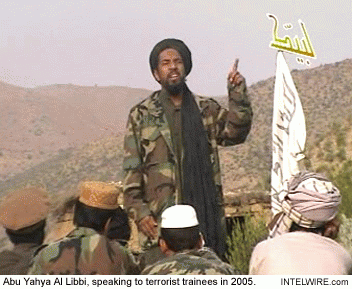Yahya al-Libbi may be the next Osama bin Laden.
In fact, he might be a better bin Laden than Osama ever was.
Al-Libbi is a top al Qaeda operative captured by the Pakistanis in 2002. He was transferred to U.S. custody and subsequently escaped from a U.S.-run prison in Bagram, Afghanistan in 2005.
His much-touted escape catapulted him to the top ranks of al Qaeda's visible leadership.
Al-Libbi has produced more videos than Ayman Al-Zawahiri over the last year. He looks increasingly impressive with each appearance.
His most recent release, this week, highlighted his strengths and may point to an elevated operational role within al Qaeda's "corporate" nexus.
The message was directed toward Saudi Muslims and contained a harsh criticism of the Kingdom's corruption and moral laxity.
While that refrain has been repeated like a drumbeat by jihadi propagandists for decades, several aspects of his recent media releases bear scrutiny.
Al-Libbi is an extremely charismatic speaker. He looks good on camera -- young, strong and handsome -- and his voice is strong and clear, with very distinct enunciation. He effortlessly conveys a sense of physical competence, and the success of his prison break speaks for itself -- every statement he makes as a free man is inherently a slap in the face to the United States.
There's no contest at all between al-Libbi and Zawahiri on the charisma front. It's like comparing Bill Clinton to Dick Cheney. What's more impressive is how al-Libbi stacks up against bin Laden.
While bin Laden is known for possessing powerful charisma in person, he's a soft-spoken orator who mumbles. His camera presence has always been frail, even in his younger days, and his military experience is limited (though it has taken on legendary qualities).
Al-Libbi scores better than bin Laden for content as well as delivery. Bin Laden is a wonk for the details of Islamic history and jurisprudence. While his intelligence is evident during such dissertations, his religious scholarship has never been highly regarded. Furthermore, his speeches tend to be rooted in the minutiae of the past.
It's not that bin Laden doesn't focus on current affairs and modern problems. Rather it's a question of balance and pacing. His pronouncements deliberately evoke antiquity. Today's grievances are grounded in a long, long history. They emanate from that history and are, in turn, woven into it.
This backward-looking tendency can resonate with Arab audiences, who share bin Laden's long view on history. But these days, Al Qaeda is becoming more and more international -- its recruit base spans Europe and the Americas and is particularly strong in Al-Libbi's home base of North Africa.
Those audiences may be significantly more receptive to Al-Libbi's pragmatic here-and-now orientation. His most recent message on Saudi Arabia provides an excellent case in point.
Although al-Libbi references history and the scholars of Islam, the message continually returns to a focus on recent events -- Saudi and Arab cooperation with the United States, the corruption of regimes that claim to be Muslim and the encroachment of U.S. influence in the Arabian peninsula.
The speech is interspersed with accounts of torture, mistreatment and blasphemy from Arab regimes, and what he characterizes as the enslavement of Arab and Muslim governments to the wishes of the U.S. and its allies. By keeping it simple and relevant, al-Libbi also comes across as a more credible Islamic scholar than bin Laden.
Al-Libbi uses extremely specific anecdotes related to recent events, such as April's mass arrest of Saudi militants, highlighting the fact that he is current and involved in the struggle, out among the mujahideen -- providing a sharp contrast to the leadership-in-exile practiced by bin Laden and Zawahiri. Images distributed on extremist Web sites even show al-Libbi conducting military training before a class of Libyan jihadists.
The content of al-Libbi's messages also reflect the diverse interests of his growing international audience. He has spoken and written in depth on topics ranging from Iraq, Afghanistan, Somalia and even the plight of children with AIDS in Libya.
Overall, al-Libbi comes across as someone living in the present, whose viewpoint is informed by the past. In contrast, bin Laden comes across as someone who is living in the past and seeks to turn back the clock. That's intentional, and it's part of his appeal for a certain segment of the fundamentalist audience.
But it's not necessarily as attractive to new recruits, many of whom are becoming radicalized in response to relatively recent U.S. policies in the Middle East. Al-Libbi is better positioned to draw moderate and modern Muslims into the nexus of al Qaeda sympathizers and supporters.
It's noteworthy that this week's message, released by al Qaeda's al-Sahab media production arm, included English subtitles even though its message seems tailored to a Saudi audience.
In the past, messages from Zawahiri which were aimed at mainly Arab audiences have been delivered without subtitles. The extra effort reflects al-Libbi's strength in speaking to the concerns of jihadis around the world.
Al-Libbi has already been connected to significant terrorist and military attacks within Afghanistan, including a daring attempt to assassinate Vice President Dick Cheney at the very same air base where al-Libbi was once imprisoned.
He has yet to score a spectacular, mass-casualty terrorist attack outside of Afghanistan, but it's only a matter of time. Saudi Arabia, the country targeted in his latest message, could be in his sights. A map of Saudi Arabia was displayed throughout the message, reminiscent of past videos by bin Laden which were keyed to specific attacks.
Should al-Libbi be able to claim a devastating attack outside Afghanistan, Osama bin Laden may find himself officially replaced. And the United States may find itself fighting an enemy with a lot more upside potential.
J.M. Berger is editor of
INTELWIRE.com






